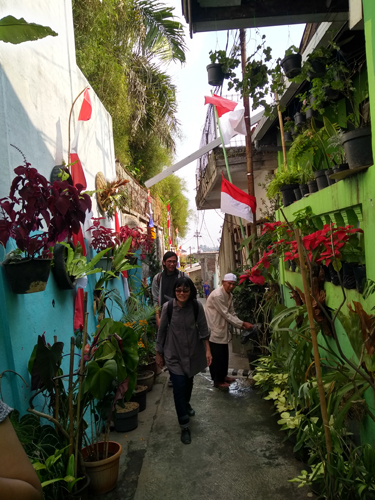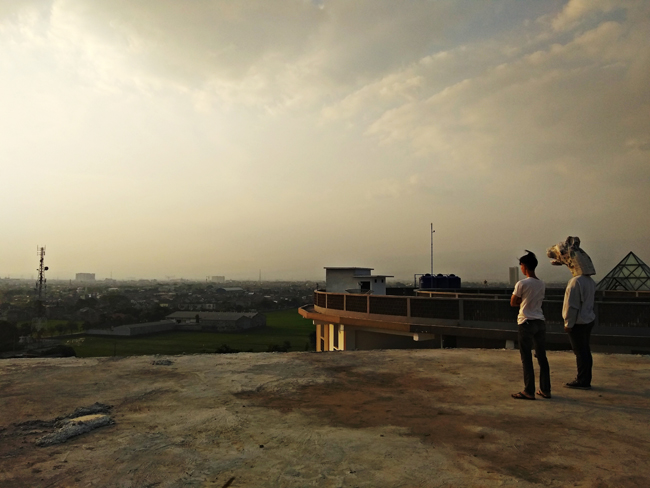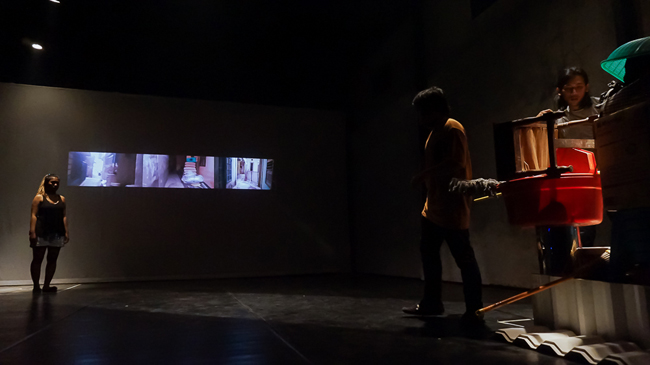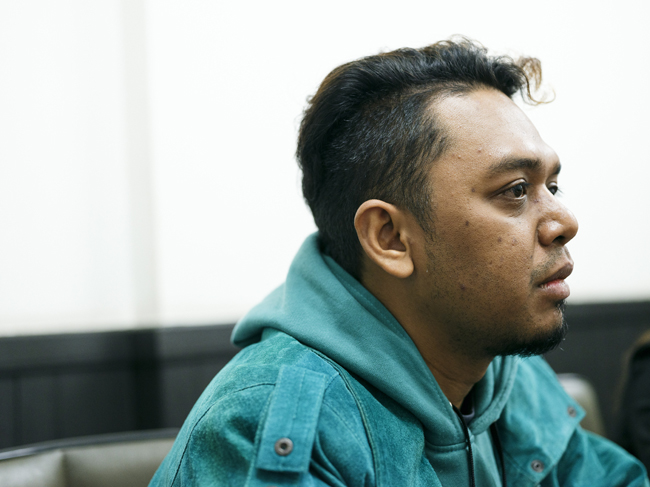A project with people who faced eviction
Fujiwara: I see. You were already practising fieldwork in your postgraduate studies. Now, following on from what I have just heard, I would like to ask you about the actual projects of the BPAF. When I met you for the first time in Bandung the other day, you showed me videos of your recent work. It was a project where you actually go into the community, and I think it was also based on fieldwork.
Taufik: That is a project called US/NOT-US. It is a project focusing on people's homes and memories. The area in question is located in the centre of Bandung and is a place where many old, traditional style buildings remain. The people who live there have moved in groups from surrounding towns and villages to find work. In the Indonesian language, such communities are called kampung, and they exist within the city too. It also refers to a community where its inhabitants come from the same village. I am also from a kampung formed by people who moved to Bandung from a town called Ciamis.
The kampung that US/NOT-US focuses on is an area where people have moved in from outside Bandung during the Dutch colonial period. When Indonesia became independent from the Netherlands, the Indonesians had no evidence that would allow them to claim ownership of the land. There are many issues such as the lack of register books, since the ancestors of these people had moved in and started living there quite naturally. But now, redevelopment has become necessary for the city to grow. So the refugees living in these kampung have become the target and are confronted with eviction. This is now happening in many places and it will very likely occur everywhere and be experienced by anyone, for those who belong to lower middle class citizens.
On the other hand, at the same time the US / NOT-US project wanted to show a new trajectory of the history of the voices of poverty and minorities (residues from urbanization) in Indonesian theaters which tended to be the heroic attitudes of artists. In our opinion urbanization continues to move with new forms even though the pattern does not change. The characteristics of determining the class of society also change. In the past, maybe people who did not have a National Identity Card and motorbike were considered the lower class. But now, people who have both are still regarded as the lower class. Being an 'artist' for us is an area of tension from getting the privilege of the term 'artist' itself, and the state of the socio-economic conditions of urbanization politics that do not stop.

Fujiwara: The stresses and strains of the past such as the independence of Indonesia from the Netherlands, modernisation and economic development are causing the people who live in the present day to receive unjust treatment.
Taufik: Yes. You could say that they are the sacrifice of urbanisation. Legally speaking, they are in a very weak position. They claim ownership of the land because they have been living there for several decades, but they either have no documents or have unverified ones. Of course, there are those who demonstrates resistance, but they would often lose the struggle. There is always a conflict going on.
Fujiwara: Your project has created a work that is inspired by this situation. What was the approach that you took?
Taufik: It was a long process. Usually, we conduct a research for four or five months, but this time, we spent a year. First, we actually visited the place where people were evicted from and started our research. Then we discovered that the case is difficult to solve because there are many complex issues. After the redevelopment, the government has a plan to build residences for people with low incomes, but there are those who remain and continue to live in the same place. Both sides are claiming their rights. We sometimes even need a permission just to enter a complex place like that.
We looked at what physically remain in the area and how people live there. We employed different methods of for research, and the first thing we did was to find people who could tell us something about the area. We invited researchers of the region and activists. While we learned from specialists, we also invited the Malaysian playwright Leow Puay Tin to create and perform a piece with Aliansyah Caniago, a performance artist from Bandung. We also did workshops.
Fujiwara: What did you actually do in those workshops?
Taufik: Leow Puay Tin talked about her experiences including her research in Japan. On the other hand Aliansyah has been creating a site-specific work at a lake that was dried up in the course of urbanisation. We had a session in which we shared our different processes. Aliansyah conducts different kinds of research at the site, creates the work and takes it to another place like a gallery or a black box space. We talked about methods of drifting and the transposition of space.

Fujiwara: Who was that workshop aimed at? I imagine it would have been for professional creators.
Taufik: Yes, this was a workshop for artists. We also had a workshop led by Leow Puay Tin for the residents who are being forced to move out. After the workshop, we cooked a meal together. It is the custom of Indonesians to cook and eat together after doing something like this. Leow Puay Tin's workshop was about bringing out stories from the residents. Using the mobile phone camera, we asked them questions like "What is your favourite place that you remember?", and they would come back with the photos. We then continued with deeper questions like "Why did you take photos of this place?" or "What was your favourite thing in the house before eviction?" and "What is your favourite part of the flat room you live now?" We asked them to take photos of the past and the present. We asked different groups of people such as children, young people and old people. We stayed in the area ourselves and conducted these workshops. And when they started to tell stories, we listened and collected them.
Fujiwara: I can see that you have a very clear methodology. Or maybe you invited an artist who has a clear methodology. Anyway, did you learn this methodology while specialising in cultural studies at your postgraduate course?
Taufik: Of course, there is an influence from my studies at university. But more than that, I work with other BPAF members, discussing things like "What are we missing?" or "Shouldn't we be sharpening this part?" We also discussed and decided who to invite for this project. We try to formulate our ideas by talking to as many people as we can.
Fujiwara: I envy you for being able to form a collective like that. I have also been involved in community related projects over the past few years and have strongly felt that it is not easy to go into communities. The fact that you can do it together with other members shows that you have a very good relationship with them.
Taufik: Not only do we hold workshops and discussions but we also try to bring back our experiences and provide feedbacks: "Was this really a useful method?" or "Did it really go well?"

doc. BPAF
The position within the collective
Fujiwara: In your current project, what is the role you play? Are you the executive director or is your position more like a coordinator?
Taufik: That's a very difficult question to answer. People say that my position is that of dramaturg*3 , but there really are many aspects to my job. For example, if other members are full of ideas, then I would just work as a facilitator. Or sometimes, I am just a troublemaker! Of course, management is required to realise these ideas, so yes, I do play different roles.
*3 Dramaturg: Originally, this term referred to people employed by public theatres in Germany as theatre specialists. After the 2000s, this concept was imported into many places around the world, and the title was used to define those who did not fit into the existing categories of director, playwright or producer. In recent years, as the job of the dramaturg becomes more diversified, there has been continuous discussion and sharing of information surrounding its exact role.
Fujiwara: With systems like Sanggar or theatre companies, the roles of director and producer are clearly defined, so those people who didn't fit into the defined roles probably assumed the title of dramaturg. But in the case of the BPAF, because it doesn't have such a system of hierarchy to begin with, maybe you are in a more flexible position.
Taufik: Yes, I think it is very flexible. If there is a position within the collective that has not been filled, then I would slip into it. Sometimes I am the photographer. It's not just me but everyone in the collective that complements each other.
Fujiwara: Do you also play the role of producer? Or is there a producer exclusively working for the collective?
Taufik: No, there isn't. Everyone takes on the responsibility of PR, and the management is done mainly by myself and another person. But we now have someone who wishes to become a producer, so we will discuss that.
Fujiwara: Here's a straightforward question: how do you secure the money for your activity?
Taufik: We don't just do one project a year, so if a member in the collective comes up with an idea, we would distribute a certain percentage from the joint fund. Sometimes we use our pocket money. So again, it is flexible.

Fujiwara: In Indonesia, are there any reliable sponsors or institutions that allow you to apply for funding?
Taufik: The BPAF does not have a proper address for gaining corporate status, and because we move around, it is difficult for us to get subsidies. There aren't any sponsors either. But there is an artists' union in Bandung that we have decided to be a part of, so the way we fundraise may start to change.






